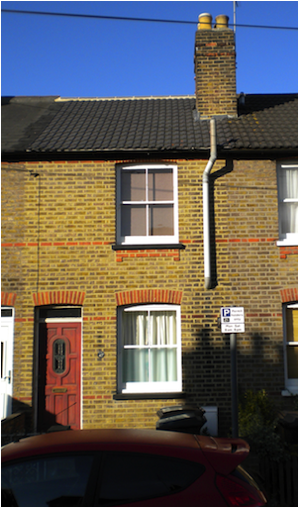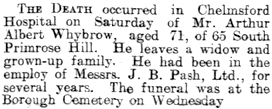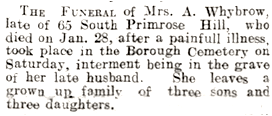Arthur Edward (usually ‘Edward Arthur’) Whybrow (sometimes ‘Wybrow’) was born and brought up in Chelmsford. After working as a plumber’s labourer he joined the army in December 1902 seeing service in Britain and at Malta. He left the army in 1905 and settled in Chelmsford where he married in 1908 , going on to have three children. He worked in a bottling factory, then at Hoffmann’s bearings works. The outbreak of war led to his recall to the army and he landed in France within a month of the conflict’s start. While there he was gassed and brought back to England. Ill-health led to his discharge from the army in March 1915 and returned to Hoffmann’s still plagued by ill-health. He died in December 1919, having lost his wife earlier in the year. His home was in South Primrose Hill.
WHYBROW, ARTHUR EDWARD,
Private, 2nd Battalion, Essex Regiment
Mr. and Mrs. Whybrow were then called the room and addressed as follows by tin Coroner: The jury have returned a verdict in accordance with the medical evidence. It is the unanimous opinion of the jury that if you or any other people have children ill you should at once call in medical aid and not trust home remedies. You may think you are doing very well, but you may get yourself into trouble. You may have thought the child little bit out of sorts, but doctor might have told you it was very serious condition.
Mr. Wybrow: I've had Dr. Newton for the others.
The Coroner: It’s s a pity you did not for this one.”
On 16th December the following year Edward, by then aged 18 years and four months, attested at Warley to join the Essex Regiment for short service (three years with the Colours and nine years in the reserve). At the time he was employed as a labourer and served in the part-time 3rd Battalion of the Essex Regiment. Edward was five feet four inches tall, weighed 125 pounds, had a 34 inch chest, fresh complexion, dark eyes, dark hair, and was a member of the Church of England.
Edward was given the service number 7401 and posted to the 2nd Battalion of the Essex Regiment on 8th April 1903. Having served ‘at Home’ since joining up Edward went overseas and served in Malta from 19th April 1904 to 4th September 1905. After that he remained ‘at Home’ until completing three year’s service during which time he obtained a good conduct badge. He left to join the reserves in December 1905.
Edward married Annie Wilkinson on 13th April 1908 at St. Mary’s Church in Chelmsford (today’s Cathedral). At the time Edward was aged 24, worked in a bottling factory and lived at 7 Rainsford Road. His bride was aged 22, lived in New London Road, Chelmsford and had been born in 1886 in Chelmsford, the daughter of James and Annie Wilkinson. When she was christened at St. John’s Church in Moulsham on 2nd February 1889 her father was a chimney sweep of Moulsham Street Chelmsford.
Edward and Annie’s three children were Cicely Laura Whybrow (born on 21st August 1908), Edward Arthur Whybrow (born on 20th April 1910), and Frederick William Whybrow (1916-1917).
In 1911 the census found 26 year-old Edward living with his wife and two young children at 53 South Primrose Hill, Chelmsford (today’s number 47). Edward was a driller at Hoffmann’s ball-bearings factory in Chelmsford. meanwhile his parents and four siblings were still living at 7 Rainsford Road. His remained employed as a bricklayer; brother Albert was a bottler at a mineral water manufacturer; and brother Bertie was a cage tester, also at Hoffmann’s.
As a reservist Edward was recalled to the Essex Regiment at Warley on 5th August 1914, the day after war was declared. he was posted initially to the regiment’s 3rd Battalion, and then to the 2nd Battalion ob 30th August 1914. He served with the expeditionary force in France from 30th August 1914 to 27th November 1914 during which time he was gassed. The remainder of his service was ‘at Home’.
Edward suffered chronic bronchitis and was discharged as being no longer physically fit for war service on 9th March 1915. By then he had served for a total of 12 years and 84 days, eight years and eight months of which were as a reservist. Upon discharge his disability was described as follows:
“Chronic Bronchitis - He states disease originated eight years ago (in Army Reserve) and has suffered from chronic cough since. He has lost weight during the last three months. Medical Board: Not result of active service, climate on service. Permanent.”
Back in Chelmsford Edward returned to Hoffmann’s and in his spare time bred rabbits. His health, however, remained fragile.
The 1918 register of electors listed Edward and his wife still at their South Primrose Hill home (then numbered 65). His parents were listed at 7 Rainsford Road, Chelmsford.
Edward’s wife Annie died in February 1919, aged 34.
Edward died on 25th November 1919, aged 36. He was buried at Chelmsford Borough Cemetery six days later, the burial register giving his home address as 65 South Primrose Hill (today’s number 65), and his occupation as millright.
On 5th December 1919 the Essex Weekly News reported:
“Ex-Soldier’s Funeral - The funeral of Mr. Edward A. Whybrow, of South Primrose Hill, took place at the Borough Cemetery on Monday, Rev. H. George officiating, Deceased, who was 36 years of age, was a reservist of the Regular Army, and in the early part of the war he served in France, with the 2nd Essex. He was gassed and invalided out early in 1915, since when he has been in ill-health. His death occurred on Nov. 25 after he had undergone two operations in the Chelmsford Hospital.
Deceased, who was the son of Mr. and Mrs. A. Whybrow, of Rainsford-rd.,lost his wife in February, and leaves a daughter and son aged 12 and 10 years respectively. An employee at Hoffmann’s Works, he was a member of the firm’s fire brigade, and he was also connected with the N.F.D.D.S.S, the A.S.E., Chelmsford Fanciers’ Association, and the London Fanciers’ Flemish Association.
The funeral was attended by a number of members of the Discharged Sailors’ and Soldiers’ federation and Hoffmann’s fire brigade, who shared the duty of bearers. The coffin was covered by a Union Jack. The mourners present were the deceased’s daughter, Laura; Mr. and Mrs. A. Whybrow, parents; Messrs. Albert, Bertie, and Stanley Whybrow, brothers; Mrs. Dodd and Miss Louise Whybrow, sisters; Mr. J, Dodd, brother-on-law; Mrs. Bus and Mrs. Turps, sisters in law; and Mr. Biggs, representing deceased’s shop-mates. the floral tributes included tokens from the latter, the fire brigade, N.F.D.D.S.S., A.S.E., Fanciers’ Association, and old friends.”
News of Edward’s funeral was also carried by the Essex Chronicle of 5th December 1919:
“Mons Hero’s Funeral. - The funeral took place at the Borough Cemetery on Monday of Mr. Edward Arthur Whybrow, of Rainsford Road, whose death occurred at the age of 36. The deceased, a widower, was called up as a reservist at the outbreak of war, and took part in the Mons retreat. He was invalided out of the Army in 1915, and returned to work with the Hoffmann Manufacturing Co. He was a member of the Hoffmann Fire Brigade, and had also been a keen supporter of the local branch of the National Federation of ex-Servicemen. He leaves two small children.
The Rev. H. George conducted the last rites. The family mourners were: Laura Whybrow, daughter; Mr. and Mrs. A. Whybrow, father and mother; Albert and, Bert, brothers; and Violet and Louise, sisters. A large number of members of the Federation attended, six of whom acted as bearers. Mr. Briggs represented the deceased’s shop mates at Hoffmann’s. Wreaths were sent from the family, Hoffmann’s Fire Brigade, the local branch of the N.F.D.D.S.S., shop mates, and the local branch of the A.S.E.”
Edward is commemorated on the Civic Centre Memorial, Chelmsford, which records his name as ‘E. Wybrow’. He is not commemorated by the Commonwealth War Graves Commission.
His father died in 1931, aged 71; his mother died in 1936, aged 72. Edward’s son Edward died in 1999.
Edward was one of the ‘South Primrose Hill Boys’.
140207

Edward was born in 1883 in Chelmsford, the eldest son of Arthur Albert Whybrow and Harriet Louisa Whybrow (nee Ginn). His father had been born c1861 in Black Notley; his mother in 1863 in Springfield.
He was baptised at St. John’s Church, Moulsham on 6th March 1886. At the time his parents were living in Moulsham Street where his father was a labourer.
Edward’s parents had married at St. John’s Church, Moulsham on 3rd June 1883. Edward’s father was then aged 22 and working as a labourer,; his bride was three years younger, and both lived in Moulsham Street.
Edward was one of eight children. His siblings (all Chelmsford-born) were: Annie S. Whybrow (born c1881), Albert James Whybrow (1886-1944), Bertie George Whybrow (1889-1939), Violet Lilian Whybrow (1893-1985), Louisa Isabel Whybrow (born in 1895), Stanley Charles Whybrow (1898-1963) and Leslie Sidney Whybrow (1900-1901).
The 1901 census found Edward, aged 17 and employed as a plumber’s labourer, living with his parents and six siblings at 7 Rainsford Road in Chelmsford (later renumbered as 132, and today the site of an Esso petrol filling station). Edward’s father was a bricklayer; his sister Annie was a general domestic servant; while younger brother Albert was a fitter’s apprentice.
In December 1901 Edward’s youngest brother died in tragic circumstances in their
home in Rainsford Road, an event that highlights the depravation that faced many working class families of the time. The Essex County Chronicle reported:
“CHILD'S SUDDEN DEATH CHELMSFORD.
REMARKS BY THE CORONER, BETTER HOUSES REQUIRED. An inquest was held on Monday at the Plough Hotel, Chelmsford, by Mr. C. Edgar Lewis, coroner, into the death of Leslie Sidney Whybrow, aged one year and nine months, son of Arthur Albert Wybrow, bricklayer's labourer, of 7 Rainsford-road.
The mother. Mrs. Harriett L. Whybrow, stated that the child had been well since birth with the exception of a little sickness and slight colds. On the 16th inst. it appeared to have a cold and cough, and she rubbed it with camphorated oil. On the following Wednesday it ate nothing but a small piece of cheese given to it by one its brothers and a little rabbit and beet hash. Witness thought it unnecessary to call in a doctor.
Next morning, at about 20 minutes past one o'clock, she woke up and found the child, which was lying on her left arm between her and her husband, dead. It was not covered by the clothes. Witness had seven other children, and they had just had the measles. She did not think the deceased had the measles.
Mr. H. W. Newton, surgeon, who was called to the deceased, said he found the child dead. A post-mortem examination revealed no signs of violence. The body was not well nourished, and was somewhat emaciated. The lungs were well marked with bronchial pneumonia. Death was due suffocation, but as the child was delicate, the continual coughing and straining, with the condition of the lungs, might account for this. He should think the child had had measles. The emaciation and absence of food in the stomach were quite in keeping with the condition of the lungs. The child could not have digested the rabbit and beef or cheese.
When the whole family was ill would be better to call in a doctor. The actual cause of death was suffocation, assisted by the condition of the lungs. He felt certain that the parents would not intentionally starve the child, but they gave it improper food - food which they had themselves. One could not educate people how to feed young children.
A Juror: If a doctor had been called in do you think the life might have been saved? - Witness: very early, yes.
The Coroner : It would have had better chance of recovery ?—Yes.
Police sergeant Scott remarked that there appeared to be no blame attaching to the parents. The mother had been an invalid for the past ten months.
The father of the deceased stated that earned about 25 shillings a week. The deceased was insured. The payments were not kept up, but he understood that he was entitled to £2 10s.
The mother, re-called, said there were three bedrooms in the house, and three rooms down stairs She thought the insurance had ‘run out,’ but the collector told her that if she paid 9s 6d. arrears she might get the £2 10s.
The Coroner: You knew your child was ill - do you think that hashed meat and rabbit good for it? — lt did not have the meat,only the stew.
And piece of cheese?—lts brother gave it that. I could not help that. The cheese was a very small piece.
It could not digest that. didn't know.
It was very improper feeding.—l didn’t think it was so bad, else I should have had a doctor ; I always do.
There is no excuse for not calling in a doctor. If you cannot pay for one you can always get an order, and it frequently means the saving of a child's life.
Addressing the jury, the Coroner said: Had the doctor been called in the chances of the child recovering would have been great, and it might have been alive now. I don't think there was any intention to neglect the child. If It was neglected it was through ignorance only. It not one of those cases where people persist failing to call in medical aid.
Police sergeant Scott deposed that the house appeared to be unfit for so many children. The living room was a large one, but it was almost underground.
Mr. Newton: The whole house is badly lighted and ventilated. These houses have been reported upon, but it has been impossible to do anything. If you turn the people out for being overcrowded they have to go on the road or into the Workhouse. Landlords will not let decent houses to people with families. The matter has been reported to the Sanitary Committee of the Town Council, but they do not know how to deal with it. There are many houses equally bad, perhaps worse.
The Coroner: Are you satisfied that the chile died from accidental suffocation, assisted the condition of the lungs?
The jury replied in the affirmative.

